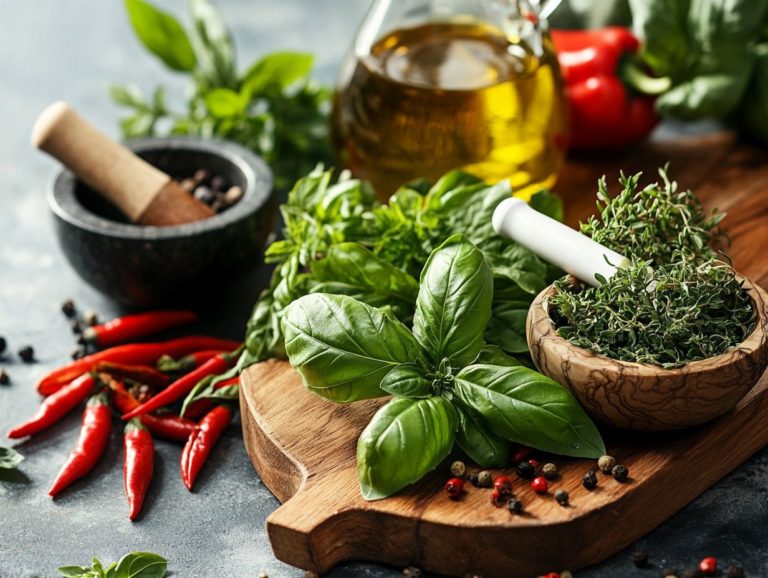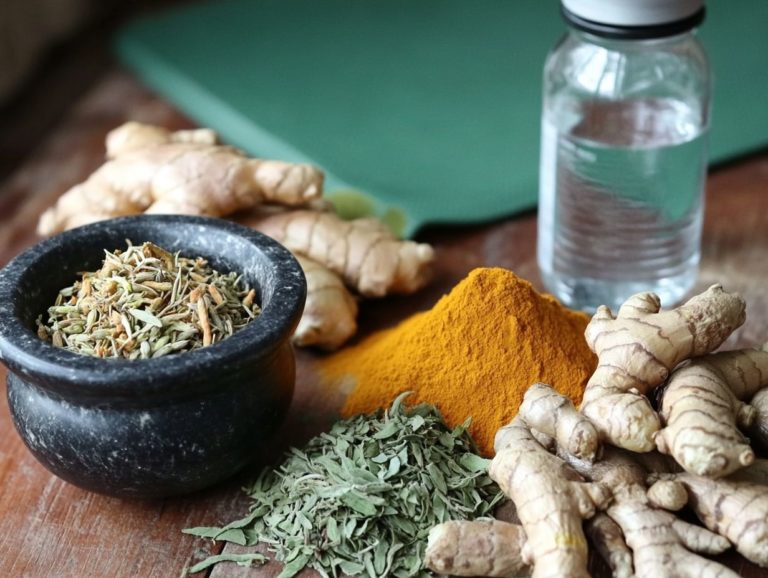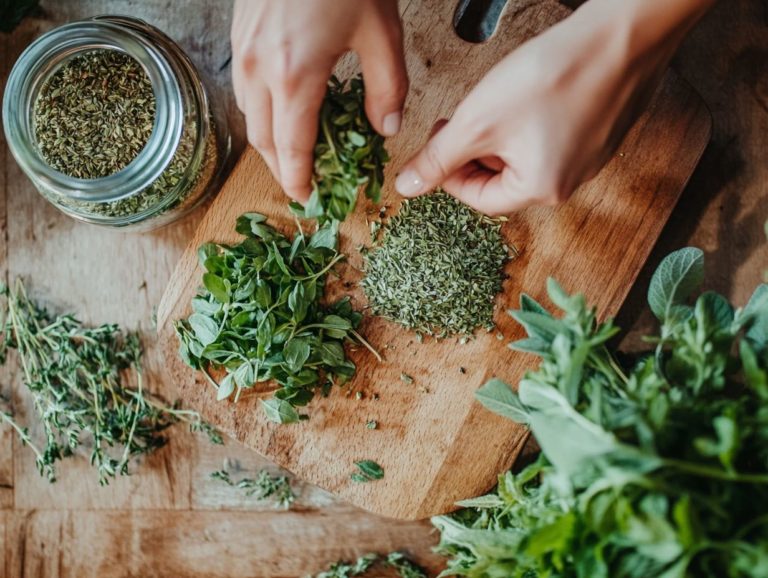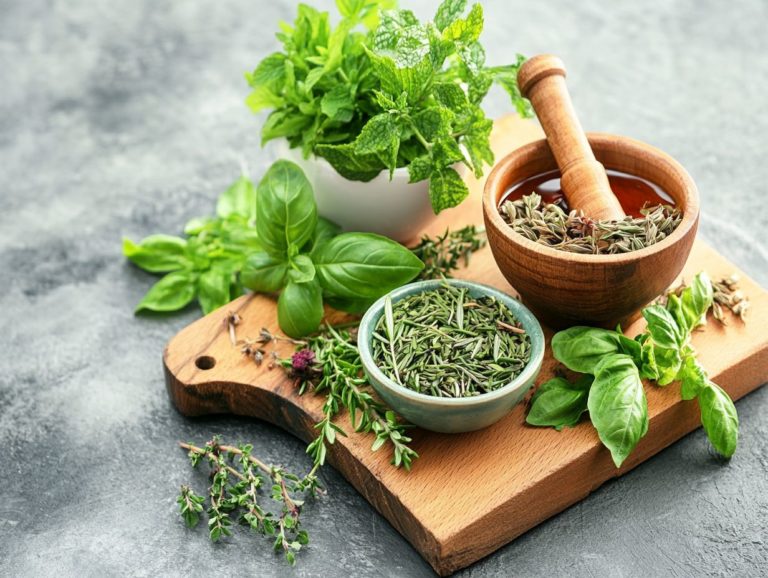5 Herbs Known for Their Culinary and Medicinal Uses
Herbs possess a distinctive ability to elevate your dishes while simultaneously providing health benefits.
You ll find five remarkable herbs: basil, rosemary, thyme, sage, and mint, each celebrated for their culinary versatility and medicinal properties.
These herbs are true powerhouses, enhancing flavors in your recipes while offering nutritional boosts and healing effects.
Explore their uses, benefits, and some lesser-known applications that can enrich both your cooking and your overall well-being.
Contents
Key Takeaways:
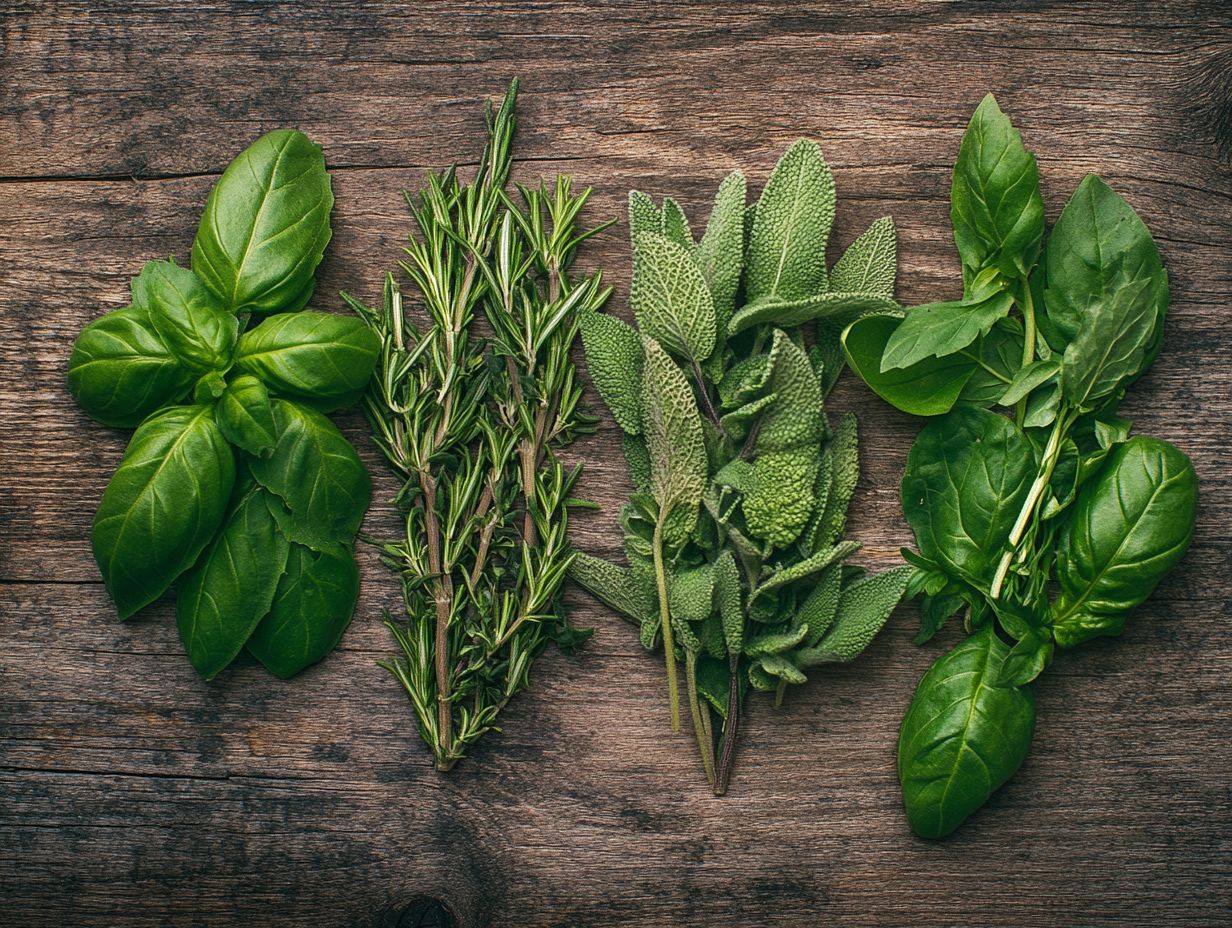
- Basil is a versatile herb known for its strong flavor and medicinal properties, making it a staple in Italian cooking and natural remedies.
- Rosemary not only adds a distinct aroma to dishes, but also has numerous health benefits, such as improving memory and reducing inflammation.
- Thyme enhances the taste of food and has antimicrobial benefits, including relieving coughs and congestion.
1. Basil: The Versatile Herb
Basil is not just a cherished culinary herb celebrated for its rich flavor; it s also a healing herb with remarkable health benefits, making it an essential ingredient in both traditional and contemporary herbal supplements.
Its impressive composition includes essential oils that boast antioxidant properties, contributing significantly to your overall health and well-being. This aromatic herb enhances a variety of dishes, from Italian pesto to vibrant Thai curries and Mediterranean salads, showcasing a unique flavor profile that perfectly balances sweetness with a hint of peppery spice.
Beyond the culinary realm, basil is highly regarded in herbal medicine for its potential to alleviate stress and reduce inflammation, thanks to its impressive array of natural compounds found in plants. Its inclusion in herbal supplements underscores its ability to support immune function and promote digestive health, allowing you to easily harness its benefits.
With ongoing research into its therapeutic properties, basil continues to be a favorite in your quest for wellness.
2. Rosemary: Aromatic and Medicinal
Rosemary is not just an aromatic herb that elevates your culinary creations; it s a powerhouse of medicinal benefits, making it an essential ingredient in both kitchens and herbal practices.
Its unique pine-like flavor beautifully complements a variety of dishes, from succulent roasted meats to vibrant vegetable medleys, significantly enhancing their taste profiles. Rosemary offers more than just flavor it s renowned for its antioxidant properties, which help combat oxidative stress in the body.
Research suggests it may even boost memory and cognitive function, making it a favored choice for anyone keen on supporting their mental well-being. It also acts as a digestive aid, potentially alleviating discomfort and promoting overall gut health.
3. Thyme: A Flavorful and Healing Herb
Thyme is not just a flavorful herb; it s a culinary gem with a reputation for its remarkable medicinal properties, particularly its antimicrobial benefits and a range of health perks.
In the kitchen, thyme s versatility truly shines. It enhances everything from Mediterranean stews and roasted meats to soothing herbal teas and rich sauces. Each dish benefits not just from its unique flavor but also from its therapeutic qualities.
This extraordinary herb has been cherished for centuries, supporting respiratory health, boosting immunity, and even easing digestive issues. Beyond its culinary applications, you ll find thyme in herbal supplements designed to tackle conditions like coughs and colds, highlighting its multifunctional role in both the realm of gastronomy and holistic wellness.
4. Sage: A Medicinal and Culinary Powerhouse
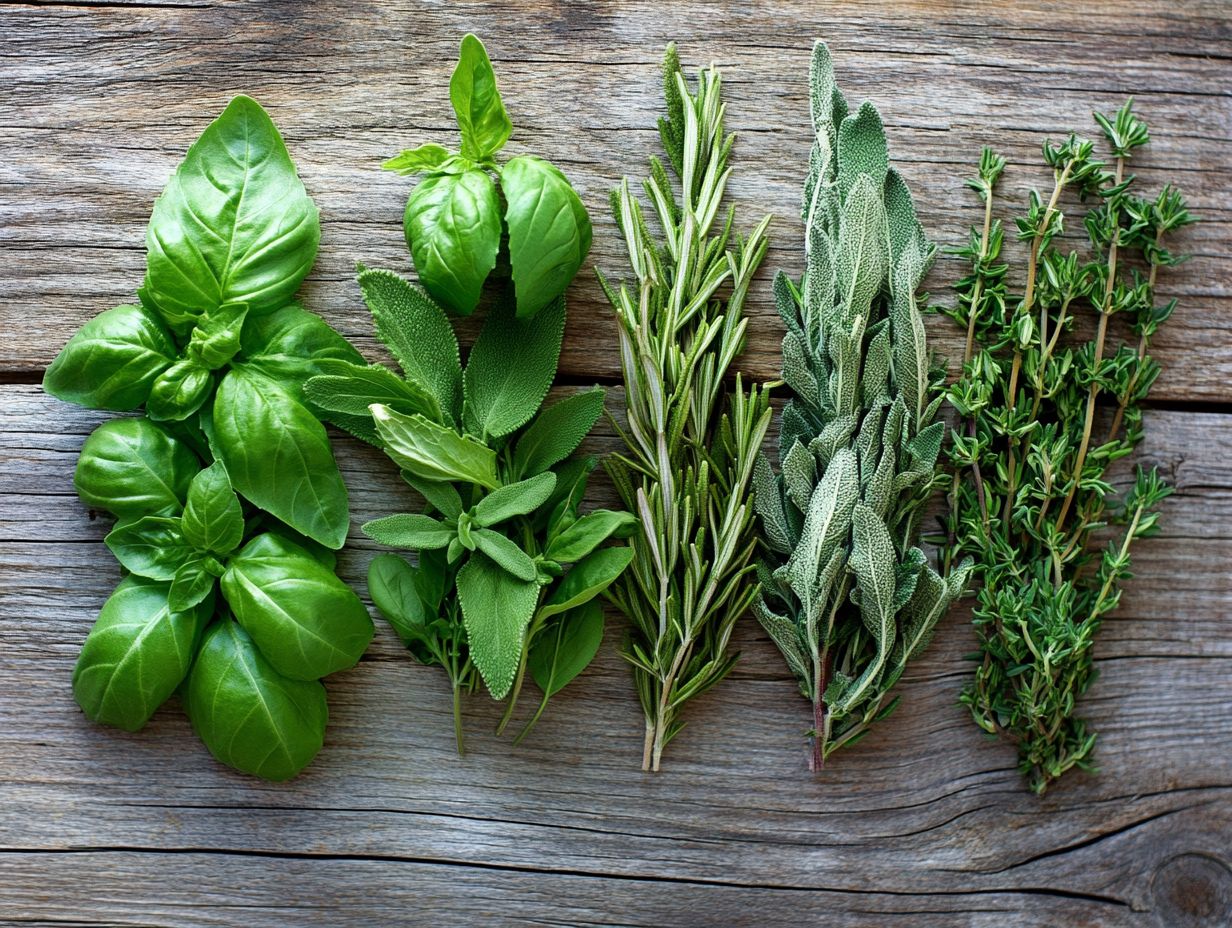
Sage is celebrated for its aromatic qualities and rich flavor. It is a remarkable culinary gem and a medicinal herb brimming with health benefits.
Its beneficial polyphenols, a type of antioxidant found in plants, contribute to its impressive healing properties. This versatile herb has found its way into traditional recipes, like sage-infused sausages and savory stuffing.
Modern dishes such as roasted vegetables and gourmet sauces also highlight sage’s unique flavor. Including sage in your meals can elevate the taste while providing medicinal advantages.
Rich in antioxidants, sage supports digestion and is linked to better brain function. This makes it a sought-after ingredient in herbal supplements designed to boost overall wellness.
Whether you’re sprinkling it fresh over pasta or steeping it in herbal teas, sage proves to be an invaluable addition to both your culinary creations and your well-being.
5. Mint: Refreshing and Medicinal
Mint is not just a refreshing herb that elevates culinary creations; it also boasts an impressive array of medicinal properties. This makes it a true gem in both cooking and herbal remedies.
You can easily infuse this vibrant herb into a variety of recipes, enhancing savory dishes or adding a refreshing twist to beverages like mint tea and cocktails.
Beyond its culinary charm, mint is known for its ability to alleviate nausea and support digestion. It is a go-to in the realm of natural remedies.
Effortlessly incorporate mint into your diet think fresh leaves tossed in salads, steeped in hot water for a soothing tea, or even in herbal supplements.
This dual-purpose herb not only tantalizes your taste buds but also promotes overall wellness. It is a critical addition to your kitchen and natural health regimen.
What Are the Common Uses of These Herbs in Cooking?
Culinary herbs like basil, rosemary, thyme, sage, and mint are critical in your kitchen. They elevate flavors and offer myriad health benefits, including being among the 5 herbs with antioxidant properties, placing them at the delightful crossroads of gastronomy and wellness.
These herbs are the unsung heroes of cuisines around the world, enriching your dishes with their captivating aromas. Take basil, for example; it s a staple in Italian cooking, gracing classic recipes like pasta sauce and pesto with its vibrant essence.
Rosemary is a Mediterranean gem, enhancing roasted lamb or chicken with its distinctive fragrance. You ll find thyme weaving its magic in French dishes, infusing stews and sauces with remarkable depth.
Sage often takes center stage in savory delights such as stuffing and sausage. Let s not forget mint, which brings a refreshing zing to Middle Eastern cuisine, transforming salads and yogurt sauces into something extraordinary.
Beyond their delightful tastes, these herbs offer significant health benefits, boasting antioxidant properties and aiding digestion. They are essential for culinary enthusiasts and anyone striving for a healthier lifestyle.
How Can These Herbs Be Used for Medicinal Purposes?
The medicinal properties of herbs like basil, rosemary, thyme, sage, and mint can be expertly harnessed through various forms think teas, tinctures, and capsules.
These remarkable plants offer an array of health benefits, often acting as natural remedies. For example, you can brew basil into a calming tea believed to help relieve stress.
Rosemary tinctures might just be the boost your digestion and circulation need. Thyme, celebrated for its powerful antimicrobial qualities, can be steeped in hot water to create a potent infusion.
Sage, traditionally enjoyed in tea for its anti-inflammatory benefits, supports oral health and overall wellness. Then there s mint, which refreshes and aids gastrointestinal health while soothing nausea.
Together, these herbs showcase the incredible potential of herbal medicine. Try incorporating these herbs into your meals and experience their amazing benefits today!
What Are the Nutritional Benefits of These Herbs?
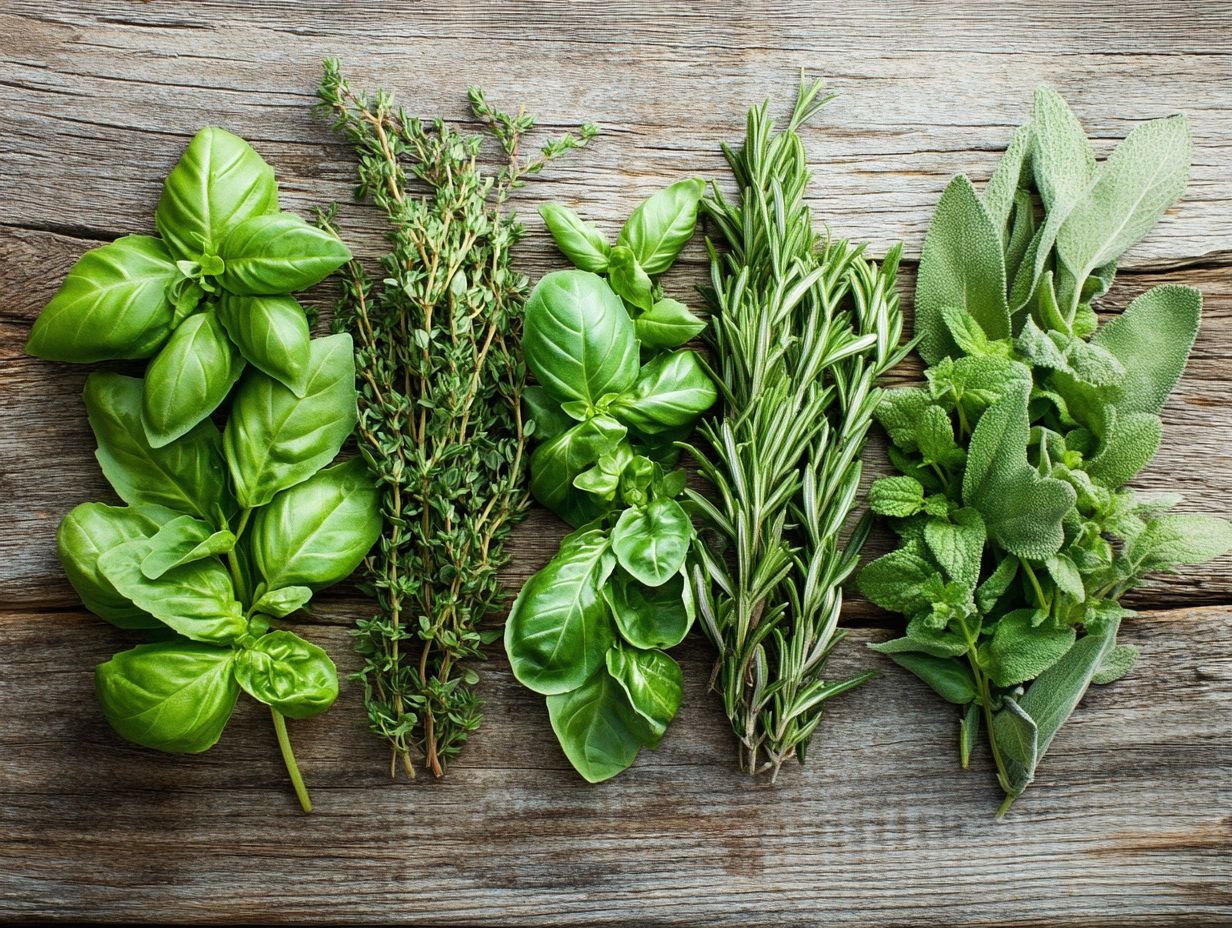
These culinary herbs do more than add flavor. They are rich in nutritional benefits, including essential vitamins, minerals, and compounds that help fight damage in your body, enhancing overall health and wellness.
Take basil, for example it’s an outstanding source of vitamin K, crucial for maintaining strong bones. Then there’s parsley, which is loaded with vitamin C, helping to fortify your immune response.
Herbs like rosemary are rich in a compound that helps reduce inflammation, known for combating oxidative stress.
Incorporate these nutrient-rich herbs into your meals, tapping into the healing properties that nature has to offer. This could potentially boost everything from digestion to heart health. So, not only do these herbs elevate your culinary creations, but they also play a pivotal role in nurturing your optimal health.
How Can One Incorporate These Herbs into Their Diet?
Incorporating culinary herbs like basil, rosemary, thyme, sage, and mint into your daily diet does more than just enhance the flavor of your meals. It offers substantial health benefits that make them essential for a balanced lifestyle.
These aromatic plants are full of antioxidants and can help reduce inflammation, promoting better digestion and overall wellness. To effortlessly weave them into your everyday meals, consider these delightful suggestions:
- Sprinkle fresh basil over your pasta dishes for a burst of flavor.
- Add rosemary to your roasted vegetables to elevate their taste.
- Drizzle a simple herb-infused olive oil over salads or grilled meats, allowing the flavors to truly shine.
- Use fresh mint as a refreshing touch in beverages, desserts, or fruit salads, transforming them with an aromatic twist.
By regularly incorporating these herbs, you can cultivate a more vibrant diet while enjoying their myriad health benefits. Start adding these vibrant herbs to your meals today and experience the health benefits for yourself!
Are There Any Risks or Side Effects of Using These Herbs?
While culinary and medicinal herbs can provide a wealth of health benefits, be cautious! Some herbs can interact with medications or worsen health issues, particularly in herbal supplements.
Some herbs, despite their advantages, can interact negatively with certain medications or worsen underlying health conditions. Take St. John’s wort, for example; it can disrupt the effectiveness of antidepressants, leading to some unwanted side effects. Similarly, herbs like garlic and ginger are celebrated for their cardiovascular perks, but they can heighten the bleeding risk, especially for those on medications that prevent blood clots.
If you have any underlying health issues or are pregnant or nursing, consulting a healthcare professional is essential, as some herbs may not be advisable in those situations. Remember, moderation is key; even those herbs that are widely regarded as beneficial should be consumed with caution to avoid adverse reactions.
What Are Some Lesser-Known Uses of These Herbs?
Beyond their well-known culinary charm, herbs such as basil, rosemary, thyme, sage, and mint possess a wealth of lesser-known applications that can significantly enhance your health. Exploring the 5 must-have herbs for your garden highlights their remarkable versatility as medicinal allies.
Take basil, for example. Revered in traditional Ayurvedic medicine, it s celebrated for its stress-relieving properties and its ability to bolster the immune system, making it a superb addition to your natural remedy arsenal.
Then there s rosemary, often lauded for its delightful aroma in beauty products, which also packs a punch as an antioxidant. This could potentially elevate your skin health and ward off premature aging.
Thyme, with its formidable antimicrobial qualities, serves as a natural disinfectant. Sage has long been a trusted companion for digestive support. And let s not forget mint its refreshing flavor does wonders for soothing digestive discomfort and promoting clear breathing.
Each of these herbs unveils a treasure trove of benefits that extend well beyond your kitchen, inviting you to explore their myriad potential in your wellness journey.
Frequently Asked Questions
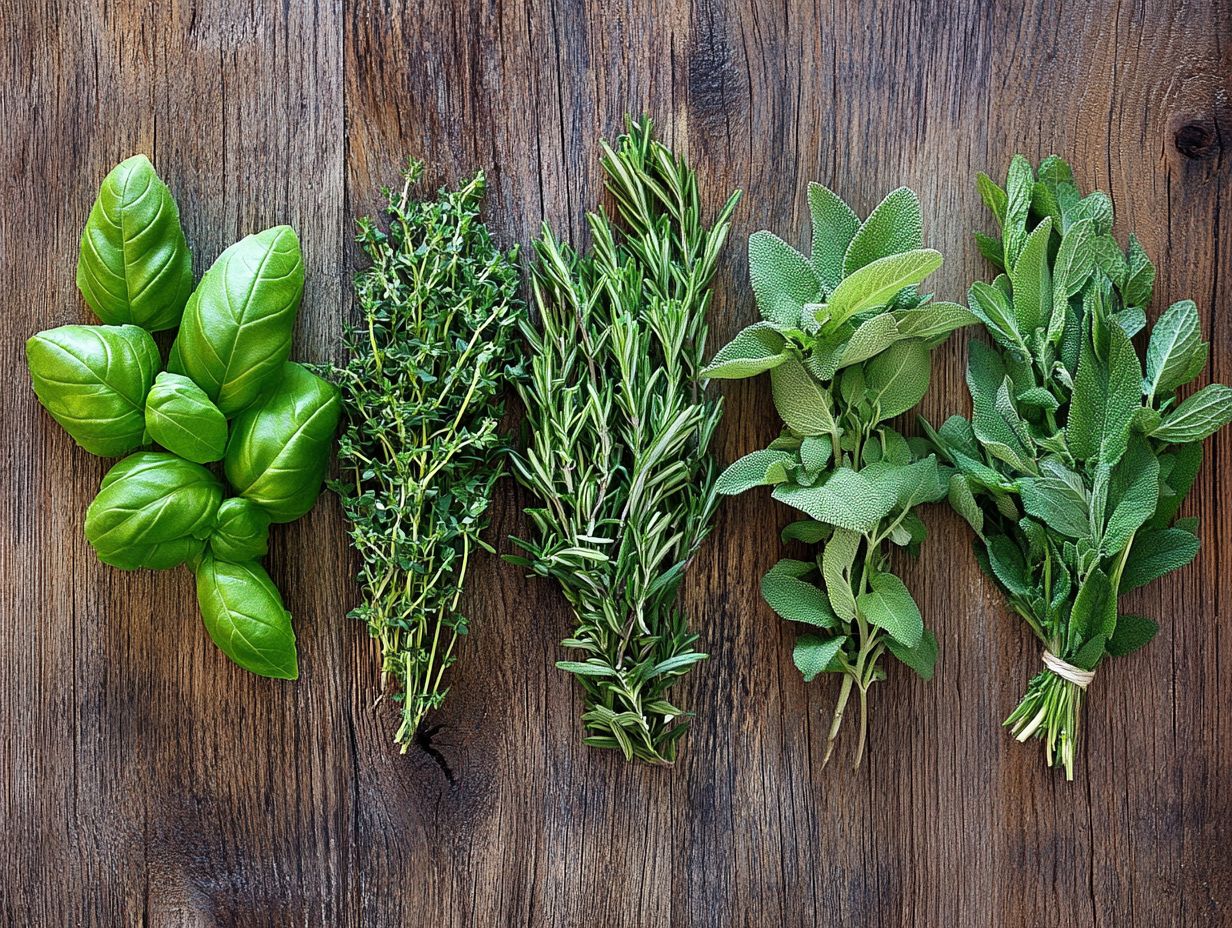
What are the top 5 herbs known for their culinary and medicinal uses?
The top 5 herbs are rosemary, thyme, basil, oregano, and sage. These herbs are celebrated for their flavors and health benefits, and you can learn more about them in the article on popular herbal supplements and their uses.
Why are these herbs popular for cooking and health?
These herbs enhance dishes with flavor. They also possess properties that promote health and wellness.
How can I use these herbs in cooking?
Add these herbs to soups, stews, marinades, sauces, and roasted vegetables. They also work great as garnishes or in pestos and infused oils.
What health benefits do these herbs provide?
Rosemary and thyme are rich in antioxidants and can reduce inflammation. Basil fights bacteria, while oregano acts as a natural antibiotic. Sage also supports health with its anti-oxidant properties.
Can these herbs have medicinal uses?
Yes, these herbs can be used medicinally. They can be brewed into teas, made into liquid extracts, or used in essential oils for benefits like better digestion, an immune boost, and reduced inflammation.
Are there any precautions when using these herbs for health?
Some herbs may interact with medications. Consult a healthcare professional before use, especially if pregnant.

